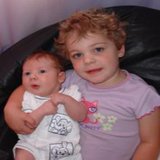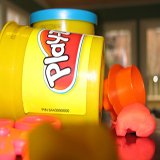Stimulating Baby Brain Development -
19 Month Old to 21 Month Old
The principal change in baby brain development at this stage is that he becomes more outward-looking.
Of course he has always been curious to learn, but now he looks further a field for stimulation.
Building self confidence has grown, leaving him emotionally ready to tackle new learning challenges.
He becomes more focused and determined - you'll discover that he becomes ever more motivated to finish what he starts.
Baby Brain Development
19 - 21 month old
Suitable suggestions for Baby Brain Development
(19 Month Old - 21 Month Old)
Feed his unquenchable thirst for new facts and information. For several months he has been keen to explore all the hidden spaces of your house.
Broaden Interest
Now is the time to broaden his sphere of interest. When you take your child shopping or to a friend's house - or anywhere at all - encourage him to look around, to pay attention to whatever is going on around him.
The activity of a busy urban street, the hustle-and-bustle of life in the aisles of a typical supermarket - all contain new stimuli to enhance his learning development.
Talk to him about his surroundings, point out the different people and objects as you move along, and respond to his questions.
Dirty Play
He loves play that involves getting his hands messy, such as painting, modeling, sand and water play.
Perhaps it's the tactile sensations he derives from immersing his hands in these substances that make these activities so pleasurable, or maybe it's just the chance to mess around without worrying about tidiness.
Either way, he learns about shape, size and patterns while engaged in that form of play. Try to build this type of activity into his regular schedule.
Memory Boosters
Give him specific tasks to strengthen his memory.
For instance, you could ask him "Can you find your ball?" or you could say "Bring me the cup from the kitchen."
He won't always carry out these instructions - in fact, you may find he doesn't return for ages having completely forgotten what it was you asked him!
Yet basic requests like these improve his short- and long-term memories.
Curiosity
At this age he needs to explore both to learn and to satisfy his curiosity. Yet you need to ensure he remains safe.
So be prepared to declare boundaries or even no-go areas if you think your exploring toddler may be at risk of injury.
Be sure to visit all the brain gym exercises pages for different ages.
Read more about the different stages of brain development.
Top Tips for Baby Brain Development
(19 Month Old - 21 Month Old)
- Engage him in conversation whenever possible.
- Reduce distractions.
- Encourage him to explore.
- Provide emotional support.
- Give him items to stimulate his use of symbolism.
Talking with you stimulates his mind, helps him consider things that he might otherwise ignore and allows you to direct his thoughts on to specific topics.
This is a good boost for his social and emotional learning development.
You can strengthen your child's ability to concentrate by reducing distractions while he plays.
For instance, turn off the television while he plays with his toys, and perhaps remove some of the toys he isn't playing with.
If your child is timid at times and is reluctant to investigate and explore on his own, say to him, for instance, "Let's look and see what this is."
Your support help him building self confidence to be more adventurous.
His trial-and-error method of learning development is effective, but results in some experiences of failure and frustration.
Always be ready with a comforting cuddle when he doesn't achieve success in the way he had hoped.
Toy vehicles, toy people or toy animals encourage him to improve imagination as he acts out scenes he makes up himself.
Suggest he tries this, if he hasn't already thought of it himself.
Top Toys for a 19 Month Old - 21 Month Old
- modeling clay or play dough
- soft toys
- shape puzzles
- wooden board games
- toy figures
- picture books
- boxes with lids
Be sure to browse through all the baby brain development pages that is broken down in different age groups.
Find It!
Can't remember where you read something specific? Just type in your search term in the box below and your specific topic will be returned to you instantly.









